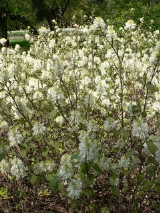
Fothergilla
Encyclopedia
Fothergilla is a genus
of two or three species of flowering plant
s in the family Hamamelidaceae
, native to the southeastern United States
.
They are deciduous
shrub
s growing to 1–3 m tall with downy twigs. The leaves
are alternate, broad ovoid, 4–10 cm long and 3–8 cm broad, with a coarsely toothed margin; they are noted for their brilliant orange or red fall colors. The flower
s are produced in spring on terminal spikes; they do not have any petals, but have a conspicuous cluster of white stamens 2–3 cm long.
.jpg) Species
Species
The genus was named in honor of physician John Fothergill
.
s for their spring flowers and fall foliage color. They are slow-growing, rarely exceeding 1–2 m tall in cultivation.
Genus
In biology, a genus is a low-level taxonomic rank used in the biological classification of living and fossil organisms, which is an example of definition by genus and differentia...
of two or three species of flowering plant
Flowering plant
The flowering plants , also known as Angiospermae or Magnoliophyta, are the most diverse group of land plants. Angiosperms are seed-producing plants like the gymnosperms and can be distinguished from the gymnosperms by a series of synapomorphies...
s in the family Hamamelidaceae
Hamamelidaceae
The Hamamelidaceae is a family of flowering plants in the order Saxifragales, including 27 genera and about 80-90 species, all shrubs and small trees...
, native to the southeastern United States
United States
The United States of America is a federal constitutional republic comprising fifty states and a federal district...
.
They are deciduous
Deciduous
Deciduous means "falling off at maturity" or "tending to fall off", and is typically used in reference to trees or shrubs that lose their leaves seasonally, and to the shedding of other plant structures such as petals after flowering or fruit when ripe...
shrub
Shrub
A shrub or bush is distinguished from a tree by its multiple stems and shorter height, usually under 5–6 m tall. A large number of plants may become either shrubs or trees, depending on the growing conditions they experience...
s growing to 1–3 m tall with downy twigs. The leaves
Leaf
A leaf is an organ of a vascular plant, as defined in botanical terms, and in particular in plant morphology. Foliage is a mass noun that refers to leaves as a feature of plants....
are alternate, broad ovoid, 4–10 cm long and 3–8 cm broad, with a coarsely toothed margin; they are noted for their brilliant orange or red fall colors. The flower
Flower
A flower, sometimes known as a bloom or blossom, is the reproductive structure found in flowering plants . The biological function of a flower is to effect reproduction, usually by providing a mechanism for the union of sperm with eggs...
s are produced in spring on terminal spikes; they do not have any petals, but have a conspicuous cluster of white stamens 2–3 cm long.
.jpg)
- Fothergilla gardeniiFothergilla gardeniiFothergilla gardenii is a flowering plant in the Hamamelidaceae family.-References:*Thomas G. Ranney and Nathan P. Lynch, Clarifying Taxonomy and Nomenclature of Fothergilla Cultivars and Hybrids, HORTSCIENCE 42:470–473. 2007....
Dwarf Fothergilla or Dwarf Witchalder - †Fothergilla malloryi Fossil from the EoceneEoceneThe Eocene Epoch, lasting from about 56 to 34 million years ago , is a major division of the geologic timescale and the second epoch of the Paleogene Period in the Cenozoic Era. The Eocene spans the time from the end of the Palaeocene Epoch to the beginning of the Oligocene Epoch. The start of the...
- Fothergilla majorFothergilla majorFothergilla major is a species of flowering plant in the Hamamelidaceae family....
Large Fothergilla or Large Witchalder - Fothergilla monticola Alabama Fothergilla or Alabama Witchalder; commonly included in F. major
The genus was named in honor of physician John Fothergill
John Fothergill (physician)
John Fothergill FRS was an English physician, plant collector, philanthropist and Quaker.- Life and work :...
.
Cultivation and uses
Fothergillas are grown as ornamental plantOrnamental plant
Ornamental plants are plants that are grown for decorative purposes in gardens and landscape design projects, as house plants, for cut flowers and specimen display...
s for their spring flowers and fall foliage color. They are slow-growing, rarely exceeding 1–2 m tall in cultivation.

